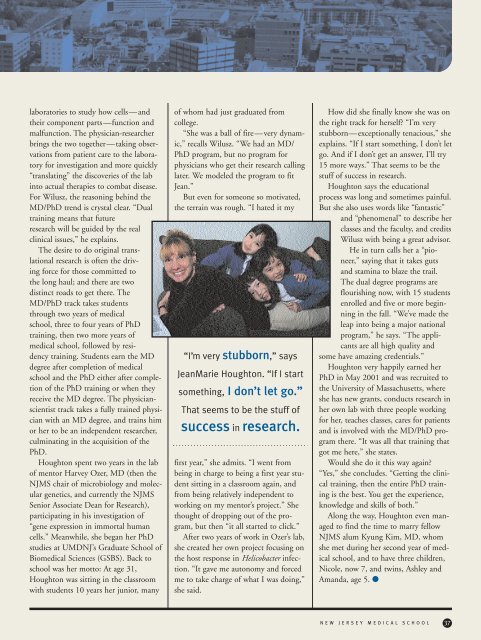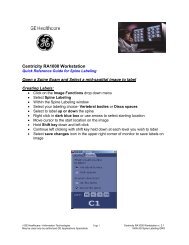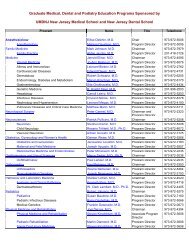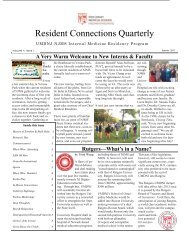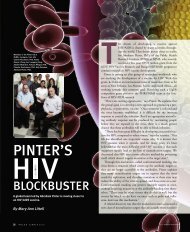changing the course of stroke - New Jersey Medical School ...
changing the course of stroke - New Jersey Medical School ...
changing the course of stroke - New Jersey Medical School ...
You also want an ePaper? Increase the reach of your titles
YUMPU automatically turns print PDFs into web optimized ePapers that Google loves.
laboratories to study how cells—and<br />
<strong>the</strong>ir component parts—function and<br />
malfunction. The physician-researcher<br />
brings <strong>the</strong> two toge<strong>the</strong>r—taking observations<br />
from patient care to <strong>the</strong> laboratory<br />
for investigation and more quickly<br />
“translating” <strong>the</strong> discoveries <strong>of</strong> <strong>the</strong> lab<br />
into actual <strong>the</strong>rapies to combat disease.<br />
For Wilusz, <strong>the</strong> reasoning behind <strong>the</strong><br />
MD/PhD trend is crystal clear. “Dual<br />
training means that future<br />
research will be guided by <strong>the</strong> real<br />
clinical issues,” he explains.<br />
The desire to do original translational<br />
research is <strong>of</strong>ten <strong>the</strong> driving<br />
force for those committed to<br />
<strong>the</strong> long haul; and <strong>the</strong>re are two<br />
distinct roads to get <strong>the</strong>re. The<br />
MD/PhD track takes students<br />
through two years <strong>of</strong> medical<br />
school, three to four years <strong>of</strong> PhD<br />
training, <strong>the</strong>n two more years <strong>of</strong><br />
medical school, followed by residency<br />
training. Students earn <strong>the</strong> MD<br />
degree after completion <strong>of</strong> medical<br />
school and <strong>the</strong> PhD ei<strong>the</strong>r after completion<br />
<strong>of</strong> <strong>the</strong> PhD training or when <strong>the</strong>y<br />
receive <strong>the</strong> MD degree. The physicianscientist<br />
track takes a fully trained physician<br />
with an MD degree, and trains him<br />
or her to be an independent researcher,<br />
culminating in <strong>the</strong> acquisition <strong>of</strong> <strong>the</strong><br />
PhD.<br />
Houghton spent two years in <strong>the</strong> lab<br />
<strong>of</strong> mentor Harvey Ozer, MD (<strong>the</strong>n <strong>the</strong><br />
NJMS chair <strong>of</strong> microbiology and molecular<br />
genetics, and currently <strong>the</strong> NJMS<br />
Senior Associate Dean for Research),<br />
participating in his investigation <strong>of</strong><br />
“gene expression in immortal human<br />
cells.” Meanwhile, she began her PhD<br />
studies at UMDNJ’s Graduate <strong>School</strong> <strong>of</strong><br />
Biomedical Sciences (GSBS). Back to<br />
school was her motto: At age 31,<br />
Houghton was sitting in <strong>the</strong> classroom<br />
with students 10 years her junior, many<br />
<strong>of</strong> whom had just graduated from<br />
college.<br />
“She was a ball <strong>of</strong> fire—very dynamic,”<br />
recalls Wilusz. “We had an MD/<br />
PhD program, but no program for<br />
physicians who get <strong>the</strong>ir research calling<br />
later. We modeled <strong>the</strong> program to fit<br />
Jean.”<br />
But even for someone so motivated,<br />
<strong>the</strong> terrain was rough. “I hated it my<br />
“I’m very stubborn,” says<br />
JeanMarie Houghton. “If I start<br />
something, I don’t let go.”<br />
That seems to be <strong>the</strong> stuff <strong>of</strong><br />
success in research.<br />
first year,” she admits. “I went from<br />
being in charge to being a first year student<br />
sitting in a classroom again, and<br />
from being relatively independent to<br />
working on my mentor’s project.” She<br />
thought <strong>of</strong> dropping out <strong>of</strong> <strong>the</strong> program,<br />
but <strong>the</strong>n “it all started to click.”<br />
After two years <strong>of</strong> work in Ozer’s lab,<br />
she created her own project focusing on<br />
<strong>the</strong> host response in Helicobacter infection.<br />
“It gave me autonomy and forced<br />
me to take charge <strong>of</strong> what I was doing,”<br />
she said.<br />
How did she finally know she was on<br />
<strong>the</strong> right track for herself? “I’m very<br />
stubborn—exceptionally tenacious,” she<br />
explains. “If I start something, I don’t let<br />
go. And if I don’t get an answer, I’ll try<br />
15 more ways.” That seems to be <strong>the</strong><br />
stuff <strong>of</strong> success in research.<br />
Houghton says <strong>the</strong> educational<br />
process was long and sometimes painful.<br />
But she also uses words like “fantastic”<br />
and “phenomenal” to describe her<br />
classes and <strong>the</strong> faculty, and credits<br />
Wilusz with being a great advisor.<br />
He in turn calls her a “pioneer,”<br />
saying that it takes guts<br />
and stamina to blaze <strong>the</strong> trail.<br />
The dual degree programs are<br />
flourishing now, with 15 students<br />
enrolled and five or more beginning<br />
in <strong>the</strong> fall. “We’ve made <strong>the</strong><br />
leap into being a major national<br />
program,” he says. “The applicants<br />
are all high quality and<br />
some have amazing credentials.”<br />
Houghton very happily earned her<br />
PhD in May 2001 and was recruited to<br />
<strong>the</strong> University <strong>of</strong> Massachusetts, where<br />
she has new grants, conducts research in<br />
her own lab with three people working<br />
for her, teaches classes, cares for patients<br />
and is involved with <strong>the</strong> MD/PhD program<br />
<strong>the</strong>re. “It was all that training that<br />
got me here,” she states.<br />
Would she do it this way again?<br />
“Yes,” she concludes. “Getting <strong>the</strong> clinical<br />
training, <strong>the</strong>n <strong>the</strong> entire PhD training<br />
is <strong>the</strong> best. You get <strong>the</strong> experience,<br />
knowledge and skills <strong>of</strong> both.”<br />
Along <strong>the</strong> way, Houghton even managed<br />
to find <strong>the</strong> time to marry fellow<br />
NJMS alum Kyung Kim, MD, whom<br />
she met during her second year <strong>of</strong> medical<br />
school, and to have three children,<br />
Nicole, now 7, and twins, Ashley and<br />
Amanda, age 5. ●<br />
NEW JERSEY MEDICAL SCHOOL 37


